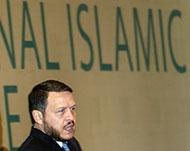Muslim scholars move to curb fatwas
The Muslim world’s top scholars have agreed that fatwas, or religious edicts, should only be issued by clerics with religious authority.

The move is meant to weaken statements by figures involved in fighting in Iraq who ordain violence.
The three-day meeting in Amman, which ended on Wednesday, has for the first time gathered representatives of eight Sunni and Shia Muslim schools of thought.
They all also agreed that followers cannot label other Muslims as “apostates”, something groups in Iraq have done to justify attacks against Iraqi police and civilians.
A conference statement said the clerics agreed that an adherent of each of the eight schools of thought “is a Muslim”.
“Declaring that person an apostate is impossible, verily his or her blood, honour and property are sacrosanct,” according to the statement read by Jordanian Religious Affairs Minister Abdul-Salam al-Abadi.
Amman Message
The meeting, which brought together about 180 scholars and clergymen from 40 countries including the United States, was sponsored by the semi-independent Al Elbeit Foundation.
|
“The issuance of religious edicts is limited to qualified Muslim clerics in the eight schools of jurisprudence” Conference statement |
The religious think-tank is led and partly financed by members of Jordan’s ruling Hashemite dynasty, which claims direct descent from the Prophet Muhammad.
Jordan‘s King Abdullah II brought the clerics together to discuss a plan to implement a Jordanian initiative declared in November.
Dubbed the “Amman Message”, the initiative urges Muslims to reject extremism, embrace moderation and tolerate other religions.
Qualified clerics
In the lead-up to the conference, 10 top Muslim clergymen – including Egypt‘s Grand Imam Sheik al-Azhar Mohammed Sayyed Tantawi and Iraq‘s Grand Ayat Allah Ali al-Sistani – ruled that fatwas must only be in the hands of qualified clerics recognised by Islam’s eight schools of thought.
“The issuance of religious edicts is limited to qualified Muslim clerics in the eight schools of jurisprudence,” said the conference statement.
It said the meeting called for “casting aside disagreement between Muslims and unifying their words and stances”.
Voice of moderation
 |
|
King Abdullah II is seen as a key |
Abdullah had told the opening meeting on Monday that Muslims must search their souls and extremists must accept the blame over the “malicious” attacks against their religion by non-Muslims after Islamic-linked terrorism and violence in countries such as Iraq.
Abdullah presided over the closing session to underline the significance he attached to the meeting. He did not address the clerics on Wednesday but sat in to hear the final communique.
The monarch is seen as a key US ally in the Middle East and a voice of moderation although his country has been criticised by fighters such al-Qaida’s Iraq chief Abu-Musab al-Zarqawi for its close ties with the West.